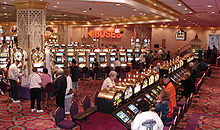There are examples of such casinos at Villa Giulia and Villa Farnese. In modern day Italian, this term designates a bordello (also called "casa chiusa", literally "closed house"), while the gambling house is spelled casinò with an accent.
During the 19th century, the term "casino" came to include other public buildings where pleasurable activities, including gambling, and sports took place. An example of this type of building is the Newport Casino in Newport, Rhode Island.
Not all casinos were used for gaming. The Copenhagen Casino was a theatre, known for the use made of its hall for mass public meetings during the 1848 Revolution which made Denmark a constitutional monarchy. Until 1937 it was a well-known Danish theatre. The Hanko Casino located in Hanko, Finland - one of that town's most conspicuous landmarks - was never used for gambling. Rather, it was a banquet hall for the Russian nobility which frequented this spa resort in the late 19th century, and is presently used as a restaurant. The so-called "Casino", a famous landmark overlooking Avalon Harbor on Catalina Island, has never been used for traditional games of chance, which were already outlawed in California by the time it was built.
In military usage in Spanish and German, a casino or kasino is a mess; a confusing linguistic false friend for translators.
The precise origin of gambling is unknown. The Chinese recorded the first official account of the practice in 2300 BC, but it is generally believed that activity of gambling, in some way or another, has been seen in almost every society in history. From the Ancient Greeks and Romans to Napoleon's France and Elizabethan England, much of history is filled with stories of entertainment based on the games of chance.
The first known European casinos was the Ridotto, established in Venice Italy 1638 to provide controlled gambling during the carnival season. It was closed in the 1770 as the city government perceived impoverish the local gentry.
In American history, early casinos were originally known as saloons. The creation and importance of saloons was greatly influenced by four major cities; New Orleans, St. Louis, Chicago and San Francisco. It was in the saloons that travelers could find people to talk to, drink with, and often gamble with. During the early 20th century in America, gambling became outlawed and banned by state legislation and social reformers of the time. However, in 1931, gambling was legalized throughout the state of Nevada, and Las Vegas, spawning America's first legalized casinos, would become world famous. In 1978, New Jersey allowed gambling in Atlantic City, now America's second largest gambling city. Other regional centers for gaming in the U.S. are Tunica Resorts, Mississippi and in the Gulf Coast region around Biloxi.
Customers gamble by playing slot machines or other games of chance (e.g., craps, roulette, baccarat) and some skill (e.g., blackjack, poker) (for more see casino games). Games usually have mathematically-determined odds that ensure the house has at all times an advantage over the players. This can be expressed more precisely by the notion of expected value, which is uniformly negative (from the player's perspective). This advantage is called the house edge. In games such as poker where players play against each other, the house takes a commission called the rake. Casinos often give out free items, known as comps to people who are gambling. Often, in most casinos, the more money a player uses the more benefits or comps the player gets. The casino determines the comps a player shall receive based upon a formula directly related to the player's average bet, the number of hours of play, and the percentage that the casino will win on the player. Comps can range in anything from free drinks during play to penthouse suites, free airfare, limo service, and free food.
Payout is the percentage won by players.
Playing with house money refers to the situation where a winning player is placing bets with money that has been won from the casino.

Las Vegas has the largest concentration of casinos in the United States. Based on revenue Atlantic City, New Jersey ranks second, and the Chicago region third.
Top American Casino Markets by Revenue (2009 Annual Revenues
* 1. Las Vegas Strip $5.550 billion
* 2. Atlantic City $3.943 billion
* 3. Chicago region $2.092 billion
* 4. Connecticut $1.448 billion
* 5. Detroit $1.36 billion
* 6. St. Louis $1.050 billion
* 7. Tunica, Miss. $997.02 million
* 8. Biloxi, Miss. $833.50 million
* 9. Shreveport, La. $779.65 million
* 10. Boulder Strip (Las Vegas) $774.33 million
* 12. Reno, Nevada $715.23 million
* 15. New Orleans, La. $653.05 million
* 18. Downtown Las Vegas $523.82 million
The Nevada Gaming Control Board divides Clark County, which is coextensive with the Las Vegas metropolitan area, into seven regions for reporting purposes.
Indian gaming has been responsible for a rise in the number of casinos outside of Las Vegas and Atlantic City.
 Given the relatively large amounts of currency that are handled within a casino, the temptation exists for both patrons and staff to commit crimes, and many casinos have security measures to prevent these. The most basic level of security today consists of cameras located throughout the property operated by highly trained individuals who attempt to locate cheating and stealing by both players and employees.
Given the relatively large amounts of currency that are handled within a casino, the temptation exists for both patrons and staff to commit crimes, and many casinos have security measures to prevent these. The most basic level of security today consists of cameras located throughout the property operated by highly trained individuals who attempt to locate cheating and stealing by both players and employees.Modern casino security is usually divided between a physical security force, which patrols the casino floor and responds to calls for assistance and reports of criminal and/or suspicious activities, and a specialized surveillance department, that operates the casino's closed circuit television (known in the industry as eye in the sky) system in an effort to detect any misconduct by both guests and employees alike. Both of these specialized casino security departments work very closely with each other to ensure the safety of both guests and the casino's assets. Some casinos also have catwalks in the ceiling above the casino floor. These catwalks allow surveillance personnel to look directly down, through one way glass, on the activities at the tables and/or slot machines.
When it opened in 1989, The Mirage was the first casino to use cameras full time on all table games.
In addition to cameras and other technological measures, casinos also enforce security through rules of conduct and behavior; for example, players at card games are usually required to keep their hands visible at all times.
One area of controversy surrounding casinos is their relationship to crime rates. Many casino opponents contend that casinos contribute to crime, and some recent research supports this. However, economics studies that do show a positive relationship between casinos and crime usually fail to consider the visiting population at risk when they calculate the crime rate in casino areas. Such studies thus count the crimes committed by visitors, but do not count visitors in the population measure, and this overstates the crime rates in casino areas. Part of the reason this methodology is used, despite it leading to an overstatement of crime rates is that reliable data on tourist count are often not available.


